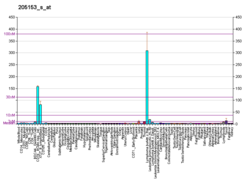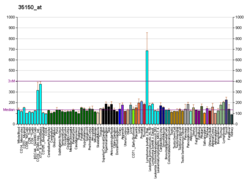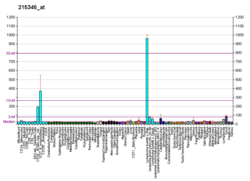CD40
分化簇40(Cluster of differentiation 40,简称CD40),是一种分布于抗原呈递细胞(APC)的协同刺激因子暨蛋白受体。CD40与辅助型T细胞上的CD154(CD40L)结合后,抗原呈递细胞会激活,并产生一系列下游反应[6]。
CD40缺失会造成第三型高IgM综合征(Hyper-IgM syndrome type 3)[6]。
结构及表达
[编辑]CD40属于肿瘤坏死因子受体超家族(TNF receptor superfamily)的一员[6]。含有AT钩构型的翻译因子AKNA可以协同调控CD40及其配体[7]。
功能
[编辑]CD40在T细胞相关的免疫和发炎反应具有重要功能,诸如免疫球蛋白类型转换、记忆B细胞发育,以及生发中心形成[6][8]。 B细胞上也有CD40存在,并会与辅助T细胞上的CD40L结合。CD40和CD40L的桥接可以激活B细胞,降低B细胞接触到抗原的反应阈值,使其更容易释放抗体。另外也可以促进B细胞的增殖、同型粘连(homotypic adhesion)、抗体类型转换。在表面蛋白的表达方面,可以刺激MHC class II、CD23、CD25(IL-12R)、CD69、CD44等分子的表达,也会使淋巴细胞功能性抗原1(LFA-1)的转为高亲合态。在细胞周期方面,则会从间期进入S期,开始进行DNA和RNA的复制及合成CD40L[6]。 有研究也发现,要激活β淀粉样物质的微胶细胞也需要CD40和CD40L的连结,因此可能也与阿尔茨海默病的病生理学相关[9]。
| 相关 | 不相关 | |
|---|---|---|
| 一般免疫 |
|
|
| 体液免疫 |
| |
| 自身免疫 |
|
|
| 胞杀作用及移植 |
| |
| T细胞选汰 | T细胞的胸腺选汰 |
交互作用
[编辑]CD40可以与TRAF2[10][11][12]、TRAF3[11][13][14][15]、TRAF6[11][15]、TRAF5[11][16]、TTRAP[17]产生交互作用。TRAF4家族的蛋白质虽不会直接与CD40作用,但可以间接增加CD40的作用[18]。
临床应用
[编辑]CD40为癌症免疫疗法的潜在标的,目前已经开发出针对该蛋白的刺激性单克隆抗体,以激活树突状细胞刺激抗癌T细胞的途径,且已有相关论文发表。现有多项临床研究正在进行[19]。
参考文献
[编辑]- ^ 與CD40相關的疾病;在維基數據上查看/編輯參考.
- ^ 2.0 2.1 2.2 GRCh38: Ensembl release 89: ENSG00000101017 - Ensembl, May 2017
- ^ 3.0 3.1 3.2 GRCm38: Ensembl release 89: ENSMUSG00000017652 - Ensembl, May 2017
- ^ Human PubMed Reference:. National Center for Biotechnology Information, U.S. National Library of Medicine.
- ^ Mouse PubMed Reference:. National Center for Biotechnology Information, U.S. National Library of Medicine.
- ^ 6.0 6.1 6.2 6.3 6.4 6.5 Laman, Jon D.; Claassen, Eric; Noelle, Randolph J. Functions of CD40 and Its Ligand, gp39 (CD40L). Critical Reviews in Immunology. 2017, 37 (2-6): 371–420 [2021-05-26]. ISSN 1040-8401. doi:10.1615/CritRevImmunol.v37.i2-6.100. (原始内容存档于2021-05-26) (英语).
- ^ Siddiqa, A.; Sims-Mourtada, J. C.; Guzman-Rojas, L.; Rangel, R.; Guret, C.; Madrid-Marina, V.; Sun, Y.; Martinez-Valdez, H. Regulation of CD40 and CD40 ligand by the AT-hook transcription factor AKNA. Nature. 2001-03-15, 410 (6826): 383–387 [2021-05-26]. ISSN 0028-0836. PMID 11268217. doi:10.1038/35066602. (原始内容存档于2021-05-26).
- ^ Grewal IS, Flavell RA. CD40 and CD154 in cell-mediated immunity. Annual Review of Immunology. 1998, 16: 111–35. PMID 9597126. doi:10.1146/annurev.immunol.16.1.111.
- ^ Giunta, Brian; Rezai-Zadeh, Kavon; Tan, Jun. Impact of the CD40-CD40L Dyad in Alzheimers Disease. CNS & Neurological Disorders - Drug Targets. 2010-04-01, 9 (2): 149–155. doi:10.2174/187152710791012099 (英语).
- ^ McWhirter SM, Pullen SS, Holton JM, Crute JJ, Kehry MR, Alber T. Crystallographic analysis of CD40 recognition and signaling by human TRAF2. Proceedings of the National Academy of Sciences of the United States of America. July 1999, 96 (15): 8408–13. Bibcode:1999PNAS...96.8408M. PMC 17529
 . PMID 10411888. doi:10.1073/pnas.96.15.8408.
. PMID 10411888. doi:10.1073/pnas.96.15.8408.
- ^ 11.0 11.1 11.2 11.3 Tsukamoto N, Kobayashi N, Azuma S, Yamamoto T, Inoue J. Two differently regulated nuclear factor kappaB activation pathways triggered by the cytoplasmic tail of CD40. Proceedings of the National Academy of Sciences of the United States of America. February 1999, 96 (4): 1234–9. Bibcode:1999PNAS...96.1234T. PMC 15446
 . PMID 9990007. doi:10.1073/pnas.96.4.1234.
. PMID 9990007. doi:10.1073/pnas.96.4.1234.
- ^ Malinin NL, Boldin MP, Kovalenko AV, Wallach D. MAP3K-related kinase involved in NF-kappaB induction by TNF, CD95 and IL-1. Nature. February 1997, 385 (6616): 540–4. PMID 9020361. S2CID 4366355. doi:10.1038/385540a0.
- ^ Hu HM, O'Rourke K, Boguski MS, Dixit VM. A novel RING finger protein interacts with the cytoplasmic domain of CD40. The Journal of Biological Chemistry. December 1994, 269 (48): 30069–72. PMID 7527023.
- ^ Ni CZ, Welsh K, Leo E, Chiou CK, Wu H, Reed JC, Ely KR. Molecular basis for CD40 signaling mediated by TRAF3. Proceedings of the National Academy of Sciences of the United States of America. September 2000, 97 (19): 10395–9. Bibcode:2000PNAS...9710395N. PMC 27035
 . PMID 10984535. doi:10.1073/pnas.97.19.10395.
. PMID 10984535. doi:10.1073/pnas.97.19.10395.
- ^ 15.0 15.1 Roy N, Deveraux QL, Takahashi R, Salvesen GS, Reed JC. The c-IAP-1 and c-IAP-2 proteins are direct inhibitors of specific caspases. The EMBO Journal. December 1997, 16 (23): 6914–25. PMC 1170295
 . PMID 9384571. doi:10.1093/emboj/16.23.6914.
. PMID 9384571. doi:10.1093/emboj/16.23.6914.
- ^ Ishida TK, Tojo T, Aoki T, Kobayashi N, Ohishi T, Watanabe T, Yamamoto T, Inoue J. TRAF5, a novel tumor necrosis factor receptor-associated factor family protein, mediates CD40 signaling. Proceedings of the National Academy of Sciences of the United States of America. September 1996, 93 (18): 9437–42. Bibcode:1996PNAS...93.9437I. PMC 38446
 . PMID 8790348. doi:10.1073/pnas.93.18.9437.
. PMID 8790348. doi:10.1073/pnas.93.18.9437.
- ^ Pype S, Declercq W, Ibrahimi A, Michiels C, Van Rietschoten JG, Dewulf N, de Boer M, Vandenabeele P, Huylebroeck D, Remacle JE. TTRAP, a novel protein that associates with CD40, tumor necrosis factor (TNF) receptor-75 and TNF receptor-associated factors (TRAFs), and that inhibits nuclear factor-kappa B activation. The Journal of Biological Chemistry. June 2000, 275 (24): 18586–93. PMID 10764746. doi:10.1074/jbc.M000531200
 .
.
- ^ Sharma S, Pavlasova GM, Seda V, Cerna KA, Vojackova E, Filip D, Ondrisova L, Sandova V, Kostalova L, Zeni PF, Borsky M, Oppelt J, Liskova K, Kren L, Janikova A, Pospisilova S, Fernandes SM, Shehata M, Rassenti LZ, Jaeger U, Doubek M, Davids MS, Brown JR, Mayer J, Kipps TJ, Mraz M. miR-29 Modulates CD40 Signaling in Chronic Lymphocytic Leukemia by Targeting TRAF4: an Axis Affected by BCR inhibitors. Blood. December 2020. PMID 33171493. doi:10.1182/blood.2020005627
 .
.
- ^ Vonderheide RH. The Immune Revolution: A Case for Priming, Not Checkpoint. Cancer Cell. April 2018, 33 (4): 563–569. PMC 5898647
 . PMID 29634944. doi:10.1016/j.ccell.2018.03.008.
. PMID 29634944. doi:10.1016/j.ccell.2018.03.008.
外部链接
[编辑]- Human CD40 genome location and CD40 gene details page in the UCSC Genome Browser.
- PDBe-KB (页面存档备份,存于互联网档案馆) provides an overview of all the structure information available in the PDB for Human Tumor necrosis factor receptor superfamily member 5 (CD40)
延伸阅读
[编辑]- Parham P. The Immune System
 2nd. Garland Science. 2004: 169–173. ISBN 978-0-8153-4093-5.
2nd. Garland Science. 2004: 169–173. ISBN 978-0-8153-4093-5. - Wang JH, Zhang YW, Zhang P, Deng BQ, Ding S, Wang ZK, Wu T, Wang J. CD40 ligand as a potential biomarker for atherosclerotic instability. Neurological Research. September 2013, 35 (7): 693–700. PMC 3770830
 . PMID 23561892. doi:10.1179/1743132813Y.0000000190.
. PMID 23561892. doi:10.1179/1743132813Y.0000000190. - Banchereau J, Bazan F, Blanchard D, Brière F, Galizzi JP, van Kooten C, Liu YJ, Rousset F, Saeland S. The CD40 antigen and its ligand. Annual Review of Immunology. 1994, 12: 881–922. PMID 7516669. doi:10.1146/annurev.iy.12.040194.004313.
- van Kooten C, Banchereau J. CD40-CD40 ligand. Journal of Leukocyte Biology. January 2000, 67 (1): 2–17. PMID 10647992. S2CID 35592719. doi:10.1002/jlb.67.1.2.
- Schattner EJ. CD40 ligand in CLL pathogenesis and therapy. Leukemia & Lymphoma. May 2000, 37 (5–6): 461–72. PMID 11042507. S2CID 39398949. doi:10.3109/10428190009058499.
- Bhushan A, Covey LR. CD40:CD40L interactions in X-linked and non-X-linked hyper-IgM syndromes. Immunologic Research. 2002, 24 (3): 311–24. PMID 11817328. S2CID 19537892. doi:10.1385/IR:24:3:311.
- Cheng G, Schoenberger SP. CD40 signaling and autoimmunity. Signal Transduction Pathways in Autoimmunity. Current Directions in Autoimmunity 5. 2002: 51–61. ISBN 978-3-8055-7308-5. PMID 11826760. doi:10.1159/000060547.
- Dallman C, Johnson PW, Packham G. Differential regulation of cell survival by CD40. Apoptosis. January 2003, 8 (1): 45–53. PMID 12510151. S2CID 22461134. doi:10.1023/A:1021696902187.
- O'Sullivan B, Thomas R. Recent advances on the role of CD40 and dendritic cells in immunity and tolerance. Current Opinion in Hematology. July 2003, 10 (4): 272–8. PMID 12799532. S2CID 43043879. doi:10.1097/00062752-200307000-00004.
- Benveniste EN, Nguyen VT, Wesemann DR. Molecular regulation of CD40 gene expression in macrophages and microglia. Brain, Behavior, and Immunity. January 2004, 18 (1): 7–12. PMID 14651941. S2CID 8081107. doi:10.1016/j.bbi.2003.09.001.
- Xu Y, Song G. The role of CD40-CD154 interaction in cell immunoregulation. Journal of Biomedical Science. 2005, 11 (4): 426–38. PMID 15153777. S2CID 202658036. doi:10.1159/000077892.
- Contin C, Couzi L, Moreau JF, Déchanet-Merville J, Merville P. [Immune dysfuntion of uremic patients: potential role for the soluble form of CD40]. Nephrologie. 2004, 25 (4): 119–26. PMID 15291139.








